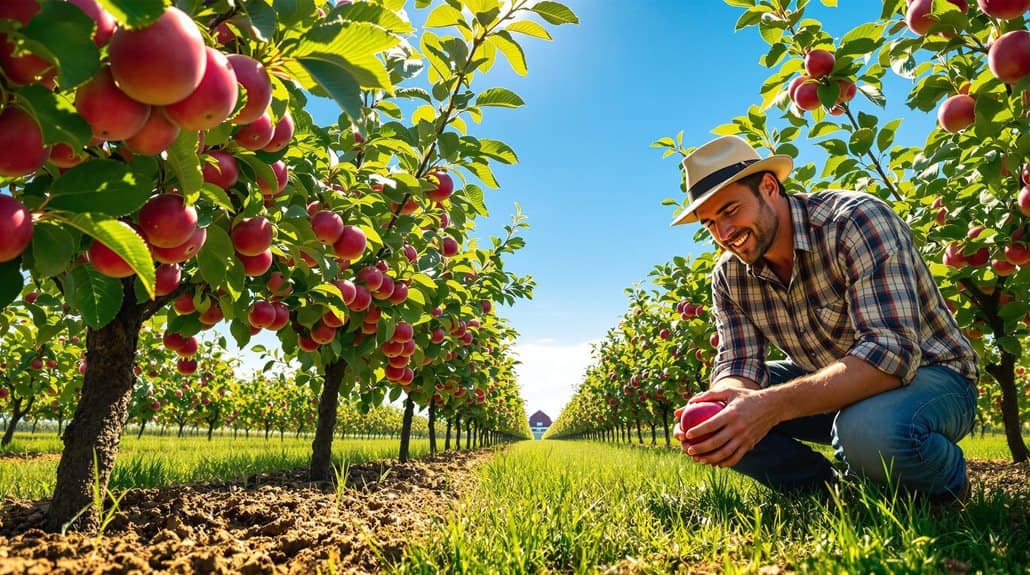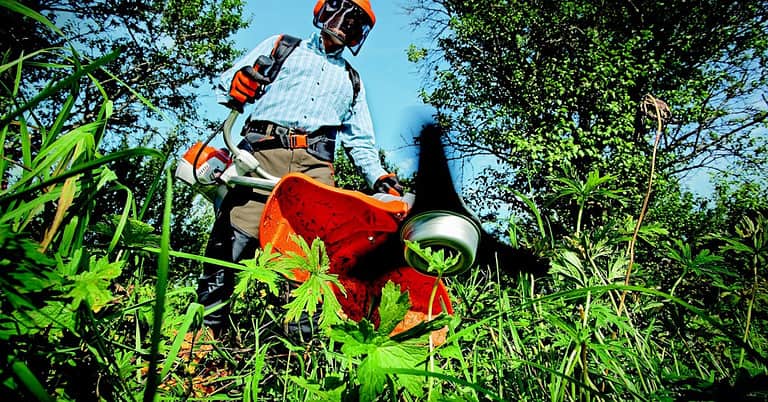Growing Organic Apples: Lessons for Success
When you decide to grow organic apples, it's vital to start with the right varieties that suit your local climate and resist common diseases. You'll quickly find that factors like soil health, sunlight, and proper tree maintenance play essential roles in your success. By focusing on these elements, you can set the stage for a fruitful harvest. However, it's not just about planting; understanding the subtleties of pest control and disease management can make all the difference. So, what specific strategies can raise your apple-growing experience to the next level?
TLDR
- Select disease-resistant apple varieties like Liberty and GoldRush for sustainable organic farming and enhanced flavor.
- Ensure at least 6 hours of sunlight and well-drained, loamy soil rich in organic matter for optimal tree health.
- Implement regular pruning and deep watering while monitoring for pests to maintain healthy apple trees.
- Harvest apples at the right time, observing color changes and firmness to ensure optimal flavor and quality.
- Utilize organic matter and promote good air circulation to improve soil health and reduce disease risks in the orchard.
Selecting the Right Varieties
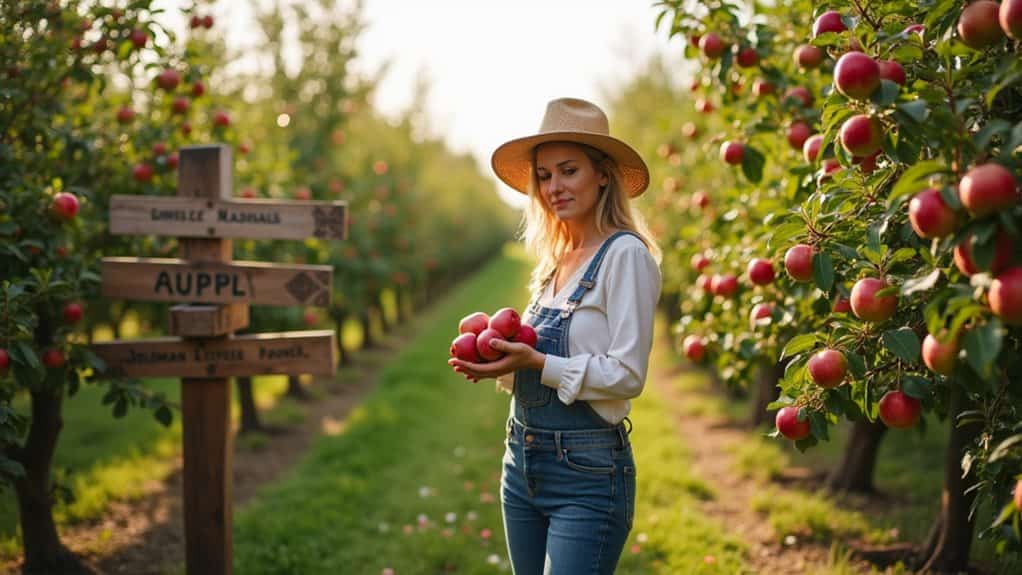
When you're selecting the right apple varieties for organic farming, it's essential to contemplate disease resistance as a top priority. You want apples that can fend off nasty stuff like apple scab, right?
Look for varieties like Liberty and GoldRush—they're not just tough, they taste great too! Additionally, many of these cultivars carry the Vf gene which provides resistance to apple scab, making them a smart choice for sustainable farming. Furthermore, understanding environmental stressors can help you choose varieties that will thrive in your specific growing conditions.
Plus, who wouldn't want to impress friends with some organic apple goodness? Happy picking!
Ideal Planting Locations
When you're thinking about where to plant your apple trees, remember that they absolutely love soaking up the sun—at least six hours a day, folks! You'll also want to make sure there's a nice breeze flowing through, because good air circulation helps keep those pesky diseases at bay, like mildew trying to crash your orchard party. And let's not forget about soil quality; if your dirt's like a soggy sponge or a brick wall, those trees are gonna throw a fit, so aim for well-drained, loamy soil that's rich in organic matter—trust me, they'll thank you with delicious apples! Additionally, selecting disease-resistant apple varieties can significantly enhance your orchard's resilience and productivity. To achieve this, ensure you start with topsoil that provides the necessary nutrients for optimal growth.
Sunlight Requirements
To grow healthy organic apples, selecting the right planting location with ample sunlight is essential. Aim for full sun, meaning your trees need at least 6 to 8 hours of direct sunlight daily.
A southern exposure is your best friend! Trust me, those sun-kissed apples will taste way better. Additionally, insufficient sunlight can lead to poor yields or no fruit, so ensuring your trees receive adequate light is crucial for their growth.
Air Circulation Importance
Good air circulation is a key factor in guaranteeing the health and productivity of your organic apple trees.
You'll want to plant them in places where air flows freely, like sloping land. Avoid spots where cold air settles—trust me, your trees will thank you! Additionally, proper spacing practices helps prevent pesky diseases and guarantees juicy, tasty apples for you to enjoy!
Soil Quality Considerations
Choosing the right soil is essential for growing healthy organic apple trees. You want slightly acidic to neutral soil, around 6.0 to 7.0 pH, to avoid nutrient drama. Well-drained, loamy soil is your best buddy—no one likes soggy roots! Test your soil, and add compost or lime as needed. Incorporating aged compost into your soil will enhance its quality and support tree growth.
Soil Fertility and Health
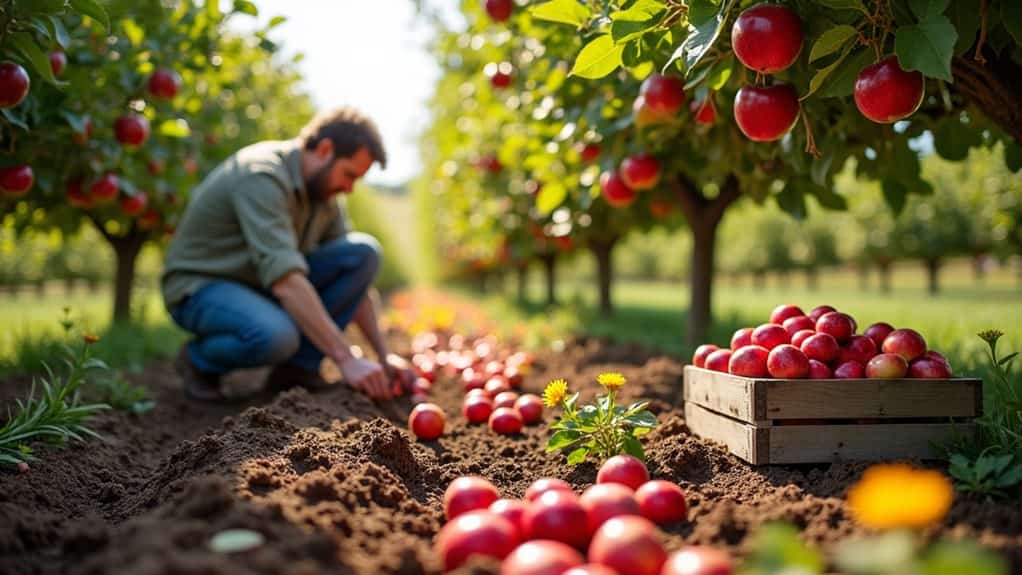
Achieving ideal soil fertility and health is essential for growing organic apples successfully. You'll want that soil pH between 6.0 and 7.0; too much acidity or alkalinity can spoil your apple dreams. Don't forget to add compost or manure for nutrients! Additionally, ensuring your soil has well-draining, loamy soil is crucial for preventing root rot. Incorporating coffee grounds into your soil can enhance its nutrient content and improve overall fertility. And hey, giving it a yearly mulch treatment is like a spa day for your trees—who wouldn't love that?
Effective Pest Control Methods
Healthy soil sets the foundation for thriving apple trees, but maintaining their health also means keeping pests at bay.
You can use organic pesticides like Bacillus thuringiensis for caterpillar control or kaolin clay to create a protective barrier. Additionally, commercial apple orchards may rely on up to 25 sprays per season, emphasizing the importance of effective pest management in organic practices. Furthermore, attracting dragonflies as natural pest controllers can significantly reduce mosquito populations and other harmful insects.
Don't forget about beneficial insects, trapping, and tree guards!
With these methods, you'll keep those pesky pests in check while your apples flourish.
Happy growing!
Disease Management Strategies
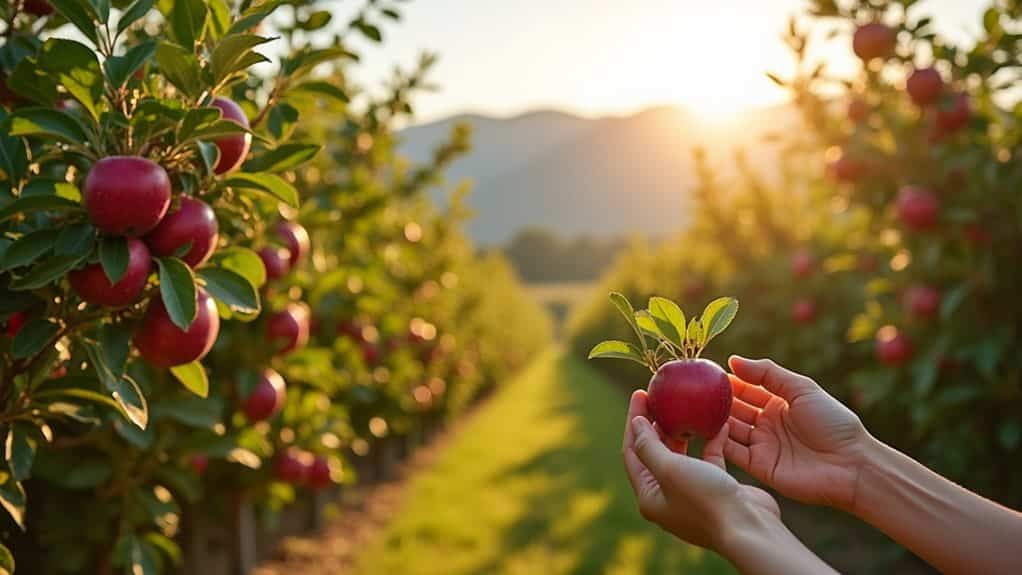
Managing diseases in your apple orchard is essential for ensuring a bountiful harvest. Start by choosing disease-resistant varieties like 'Liberty' or 'GoldRush'—they're like the superheroes of apples! Regular pruning and cleaning up fallen leaves help keep those sneaky pathogens at bay. Additionally, be proactive with copper fungicide applications prior to bud break, as they are crucial in preventing the spread of apple scab. Effective drainage practices are also important in maintaining healthy soil conditions that can resist disease. And don't forget organic fungicides; they're your trusty sidekicks in this journey!
Happy growing, future apple guru!
Harvesting Techniques
When it comes to harvesting those delicious organic apples, timing is everything—trust me, you don't want to bite into a sour one!
You'll want to keep an eye on the calendar, as different varieties are ripe for picking at different times, so grab your gear and get ready for some fun in the orchard. Quality of crop relies heavily on effective harvesting techniques, so be sure to employ the right methods to protect your fruit during the process.
And remember, treating those apples gently is key; after all, nobody likes a bruised fruit, right?
Optimal Harvest Timing
Timing your apple harvest is essential for ensuring maximum flavor and quality. You don't want to pick too early or too late!
Check for bright colors, firmness, and that satisfying twist-off. Remember, each apple variety has its own schedule, so keep an eye on your favorites. The harvest season spans from August to October, so plan accordingly to capture the peak ripeness of your apples.
You'll be munching on the juiciest apples if you nail this timing—trust me, it's worth it!
Proper Handling Procedures
Proper handling procedures during apple harvesting are essential for preserving the quality of your fruit.
Use the roll picking method—grasp that apple, roll it back, and let it snap off!
Remember, gentle placement is key; cushion those apples with your hands. No throwing or dropping, alright? Additionally, be mindful of apple ripening to ensure you're harvesting at the right time for optimal flavor.
And keep those ground apples separate—nobody likes a bruised fruit salad!
Happy harvesting!
Tree Maintenance Practices
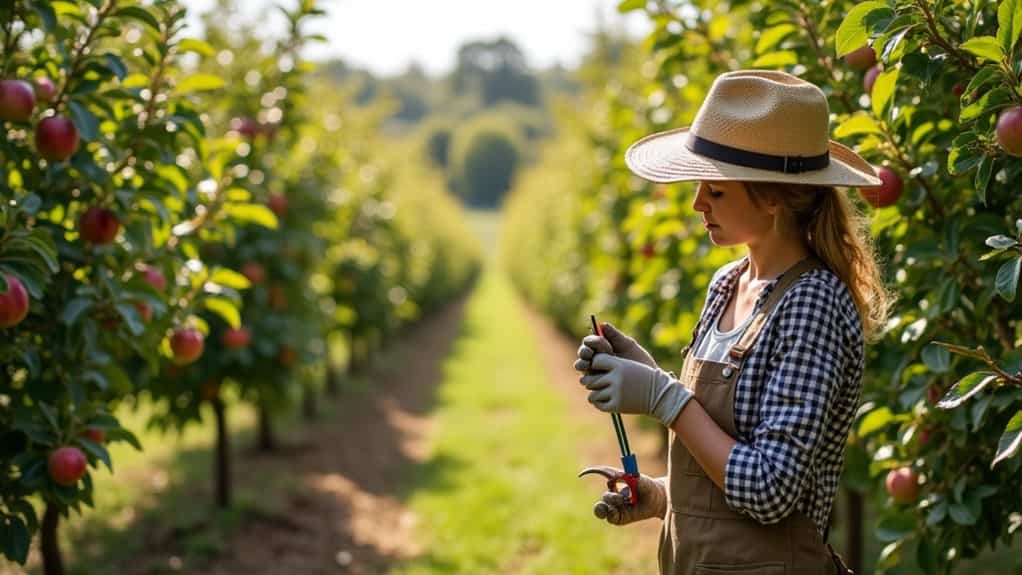
Regularly maintaining your apple trees is essential for promoting healthy growth and maximizing fruit production.
Prune during late winter or early spring, snipping off dead branches like you're giving your tree a haircut! Pruning enhances air circulation and light penetration, which is vital for fruit development.
Water deeply every week or two, and keep an eye out for pests.
Trust me, a little TLC goes a long way in making those apples shine bright!
Understanding Climate Adaptations
After you've taken care of tree maintenance, understanding how climate impacts apple growth becomes vital.
You wouldn't want your apples freezing their little buds off in early spring, right? Aim for that sweet spot of 40°F to 70°F for budding, and keep an eye on those chill hours! Selecting heat-tolerant apple varieties can also help mitigate the effects of rising temperatures on your orchard.
Choosing the right variety for your climate can make your orchard thrive—no pressure!
Importance of Air Circulation
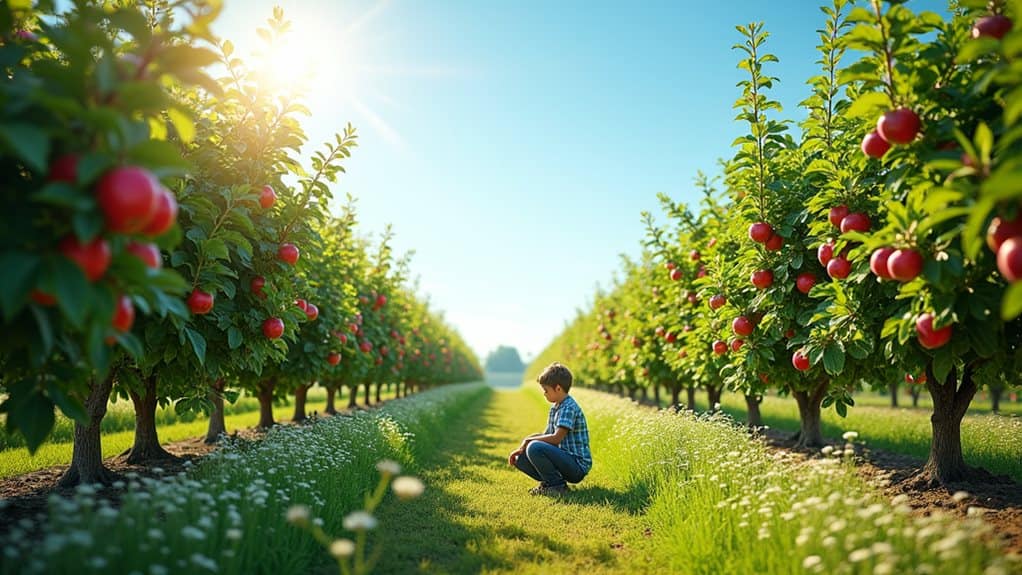
Air circulation plays an essential role in maintaining a healthy apple orchard, impacting everything from disease prevention to fruit quality. You wouldn't want mildew crashing your apple party, right? Good airflow keeps those pesky diseases at bay, helps your apples grow bigger and juicier, and prevents cold air from ruining your winter. Additionally, proper care techniques improve fruit quality, ensuring that your harvest is both plentiful and delicious.
Utilizing Organic Matter
Utilizing organic matter is essential for nurturing a thriving apple orchard. It enhances nutrient availability, helps your soil hold water, and encourages beneficial microorganisms. Think of compost and manure as your orchard's best pals! They keep your trees happy and healthy, reducing the need for synthetic fertilizers. Plus, who doesn't love a resilient, well-structured soil that supports awesome apple growth? Additionally, organic fertilizers contribute to soil health, ensuring that your apple trees flourish for years to come.
And Finally
So, there you have it! Growing organic apples isn't just about planting a tree and hoping for the best; it's about choosing the right varieties, nurturing your soil, and keeping those pesky pests at bay. Think of it like being a detective—solving the mystery of how to grow the tastiest apples! So grab your gardening gloves, get out there, and let those trees flourish. Who knows, you might just grow the next apple that makes everyone say, "Wow!" 🍏

